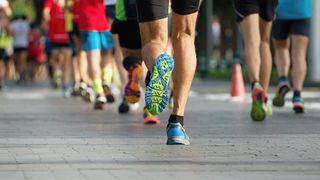Nine Things I Learned Running The London Marathon At 45
Tips for surviving (and even enjoying) training for and running a marathon in middle age

Whatever your age and level of fitness, running a marathon is a serious commitment that places huge demands on both your time and body. So as a 45-year-old father of two young children who only took up regular sporting activity in the summer of 2016, Marc Gadian demonstrated great bravery (or perhaps foolishness) when he agreed to tackle the 2017 London Marathon. Here are nine things he learned from the experience.
Getting Into A Training Routine Is The Hardest Part
“Trying to establish a routine and getting used to the early morning starts was tough. Towards the end it became habitual, but early on – certainly on the cold winter mornings, running with snow or ice on the ground – it was pretty hard.”
RECOMMENDED: Marathon Training Plans For All Levels
Running Is As Good For The Mind As It Is For The Body
“An unexpected side effect I enjoyed was the time alone running gave me. My life can be very chaotic, so it was nice to zone out on the roads by myself.”
Mix Up Your Routes To Keep Training Interesting
“The only changes I made to my runs were the routes themselves to avoid boredom. It’s important to keep discovering new places. “
Hitting At Least 20 Miles On Your Longest Run Will Make A Big Difference
“My training didn’t progress as quickly as I hoped it would. I was doing two short runs in the week and one long run at the weekend, but it wasn’t that long. Only in the final few weeks did I reach half marathon distance which was taking me 2½ hours – finding more time to run wasn’t possible.
“On the day of the marathon I was in uncharted territory when I passed 25km. My legs were sore, and my feet were aching and began to blister. I ran and walked from that point.
Get the Coach Newsletter
Sign up for workout ideas, training advice, reviews of the latest gear and more.
“I would certainly recommend getting up to 20 miles [32km] in training runs. I was getting to 13 or 14 at a push. You need to hit 20 at some point.”
If You Get Ill, Don’t Rush Your Comeback
“At one point I picked up some sort of virus. It laid me low for couple of weeks and put me behind in my training. To try to make up for that I came back too early and went too quick. I ended up hurting my achilles, which delayed me even further.
“Don't come back too early and when you do, take care to build up your training gradually.”
RECOMMENDED: Don’t Let Injury Or Fatigue Derail Your Marathon Training
Listen To Your Body When It Comes To Hydration And Nutrition
“I did change my diet during training even though I didn’t intend to. My body became very adept at telling me what I needed and what I didn’t. I was drinking a lot more water – my body really craved it. On the rare occasion I did drink alcohol or eat a curry my body was, shall we say, very quick in getting rid of it. I developed a more intuitive understanding of what my body actually needed and my craving for treats subsided.”
Don’t Let Race-Day Nerves Get The Best Of You
“I remember waking up a couple of nights before the day worrying. You do hear stories of unfortunate episodes – of blistering and chafing and toenails falling off. I’m currently sporting a couple of black toes myself. The build-up to the race and the final hours beforehand were quite nerve-racking. I was very happy to get under way and get down to the serious business of trying to finish.”
You Can Rely On The Crowd To Get You Over The Line
“I very much enjoyed the race – what an experience! The crowd were immense and my fellow runners were very supportive. Everyone is cheering you on and that was without doubt the main reason I got myself over the line.
“I saw my son at 30km, who was anxious to know why I was taking so long. I tried to reassure him I’d get home as soon as I could.”
Be Realistic – And Remember To Take Stock Of What You Achieve
“If you told me I was going to run a marathon at my age I would have laughed at you. I’m fitter, healthier and happier now. I’ve lost two stone [12.7kg] in weight. I can run after my son and catch him – then let him go and catch him again. I am going to continue to run because I enjoy being healthier. Nothing like the marathon though.
“It’s important to be realistic in your expectations. Know your starting point and remember where you were before you started. However far you get, you will have won.”
RECOMMENDED: How To Get A London Marathon Charity Place
Marc Gadian ran in partnership with Lucozade Sport’s Made to Move Campaign, designed to get a million people moving more by 2020. Lucozade Sport is an official sponsor of the Virgin Money London Marathon. To find out more about the campaign visit lucozadesport.com

Nick Harris-Fry is a journalist who has been covering health and fitness since 2015. Nick is an avid runner, covering 70-110km a week, which gives him ample opportunity to test a wide range of running shoes and running gear. He is also the chief tester for fitness trackers and running watches, treadmills and exercise bikes, and workout headphones.
